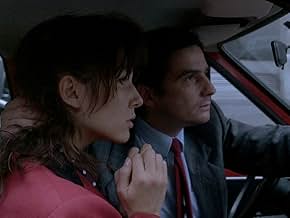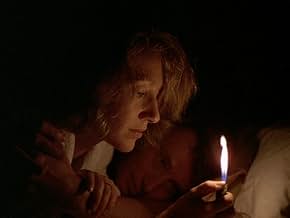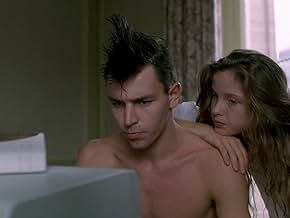NOTE IMDb
5,7/10
2,5 k
MA NOTE
Un détective, licencié d'un hôtel parisien après qu'un meurtre y a eu lieu, poursuit son enquête, aidé par son neveu inspecteur et la petite amie de celui-ci.Un détective, licencié d'un hôtel parisien après qu'un meurtre y a eu lieu, poursuit son enquête, aidé par son neveu inspecteur et la petite amie de celui-ci.Un détective, licencié d'un hôtel parisien après qu'un meurtre y a eu lieu, poursuit son enquête, aidé par son neveu inspecteur et la petite amie de celui-ci.
- Réalisation
- Scénario
- Casting principal
- Récompenses
- 2 victoires et 2 nominations au total
Ann-Gisel Glass
- Anne
- (as Ann Gisel)
Cyrille Autin
- Punk Groupie
- (non crédité)
Erich von Stroheim
- Arthur von Furst
- (images d'archives)
- (non crédité)
Avis à la une
Typical for its director, this overpopulated crime puzzle is made with brilliant style and has its moments of miniature intellectual insights and wit and is never boring, but on this occasion doesn't quite add up.
THEME: A murder in a hotel room. Who was killed and why? And by who? Is it past or present? And does it even matter? Three characters are detectives watching the story unfold and interacting with it, much like we, the audience. They piece together the clues to a story that eventually becomes their own; folding between the facts of a crime committed two years ago that repeats itself within the film and eventually leads both us and them towards the actions of the film's final act. It's subtle, but presented in Godard's typical style that many seem to have a problem with. DECONSTRUCTION #1: Here we have a detective film about detective films and about the relationship in such films between the characters and the audience. So we have ourselves represented by Laurent Terzieff, Aurelle Doazan and Jean-Pierre Léaud, who hide out in a cramped hotel room and observe the entrance of the building with the aid of small video camera which presents the image back again on a TV monitor.
CINEMA: If you're familiar with Godard's work then such devises should be recognisable, with the film using the clichés of detective cinema as window-dressing to express greater themes on the notions of relationships, as well as the role of cinema itself. We also have the self-referential aspect suggested by the opening shot, in which the scene that we are looking at and hear commentary on turns out to be something that has already happened, played back from the detective's surveillance video. We also have the notion of film as a background cacophony, with a number of scenes taking place in rooms where television sets conspire to distract us from the action at hand. DECONSTRUCTION #2: Three characters caught up in the clichés of a post-war crime picture, with a secondary plot about money and a farcical plan from both sides to double-cross the Mafia and each other. Does it matter? Yes and no. I disagree with the first reviewer who claims that this film is something of a throwaway in Godard's career; one that puts formal experimentation over content and theme. The plot is silly, but it's silly for a reason and goes back to Godard's earliest film, À bout de soufflé (1960), in which he played with the codes and conventions of American gangster cinema in a way that was progressive and entirely deconstructive.
ACTEURS: The film works as a result of the perfect casting. In fact, I'd say that the acting in this film is far better than any other film of Godard's that I have seen, and I've seen 25 of them. Léaud is obviously something of a regular in the films of Godard and his manic energy and uncomplicated air of boyish precociousness as this mysterious detective - trying to piece together a murder that may have happened or may be about to happen - is as bright as it was in films like Masculin, féminin (1966) and La Chinoise (1967). Likewise, Nathalie Baye, familiar from the director's earlier, more experimental feature Sauve qui peut (la vie) (1980) gives one of her best performances as a despondent housewife caught between two men as she tries to retrieve money to start a new life, but remains unsure of which man to draw allegiance to. The two men are boxing promoter and American cinema construct Johnny Hallyday, who breezes through the film chain-smoking and shooting pool as gangsters and cops threaten his plans from both sides, and Claude Brasseur, a pilot and the husband of Baye's character, once again, desperate to play both sides off against one another for the benefit of financial gain.
DECONSTRUCTION #3: Once again, we have Godard reducing the characters to meagre iconographic constructs that are placed in a knowingly cinematic environment that is continually challenged by the director's experimentations with content and form. Despite this however, the characters remain likable, intelligent and recognisable, with the convincing performances from the incredibly talented cast managing to compete with the cold, deconstructive formality that Godard strives for in his presentation. L'ARGENT: A film made for financial gain about financial gain, or at least, the promise of such. According to film critic Colin McCabe, Détective (1985) was produced as a favour to Alain Sarde so as to secure the funding for the director's dream project - the subsequent 'Je vous salue, Marie' (1985) - and this notion of desperation, and the wanton pursuit of money is almost self-referential in design. CRITIQUE: I honestly can't understand why so many admirers of Godard's work found this film disengaging. If you're already familiar with Godard's characteristic approach to cinema, then half of the work is already done. For me, the film was rich in character and ideas, and intelligently put together in a way that made the viewing of the film interesting and unique.
GODARD: Many would have you believe that Godard peaked in 1967, but this simply isn't the case. He's produced many fine films - Détective included - that require patience and perception on the part of the audience, and all released post-1980. This particular film might be considered a throwaway work by many Godard fans, but I would politely disagree. Like his best work, Détective is filled with ideas and a sharp commentary on the nature of cinema and the relationship between the director, the film, the characters and the audience. It does take work, but I feel that the work is worth it when we're dealing with something as interesting and progressive as this; with Godard throwing in all sorts of little jokes and observations (the detective as Prospero, aided by a character named Ariel, and with Léaud as the comic personification of Caliban, who eventually overcomes his master), whilst simultaneously turning in one of his most radical and well-rounded deconstructions on the nature of film and film viewing.
CINEMA: If you're familiar with Godard's work then such devises should be recognisable, with the film using the clichés of detective cinema as window-dressing to express greater themes on the notions of relationships, as well as the role of cinema itself. We also have the self-referential aspect suggested by the opening shot, in which the scene that we are looking at and hear commentary on turns out to be something that has already happened, played back from the detective's surveillance video. We also have the notion of film as a background cacophony, with a number of scenes taking place in rooms where television sets conspire to distract us from the action at hand. DECONSTRUCTION #2: Three characters caught up in the clichés of a post-war crime picture, with a secondary plot about money and a farcical plan from both sides to double-cross the Mafia and each other. Does it matter? Yes and no. I disagree with the first reviewer who claims that this film is something of a throwaway in Godard's career; one that puts formal experimentation over content and theme. The plot is silly, but it's silly for a reason and goes back to Godard's earliest film, À bout de soufflé (1960), in which he played with the codes and conventions of American gangster cinema in a way that was progressive and entirely deconstructive.
ACTEURS: The film works as a result of the perfect casting. In fact, I'd say that the acting in this film is far better than any other film of Godard's that I have seen, and I've seen 25 of them. Léaud is obviously something of a regular in the films of Godard and his manic energy and uncomplicated air of boyish precociousness as this mysterious detective - trying to piece together a murder that may have happened or may be about to happen - is as bright as it was in films like Masculin, féminin (1966) and La Chinoise (1967). Likewise, Nathalie Baye, familiar from the director's earlier, more experimental feature Sauve qui peut (la vie) (1980) gives one of her best performances as a despondent housewife caught between two men as she tries to retrieve money to start a new life, but remains unsure of which man to draw allegiance to. The two men are boxing promoter and American cinema construct Johnny Hallyday, who breezes through the film chain-smoking and shooting pool as gangsters and cops threaten his plans from both sides, and Claude Brasseur, a pilot and the husband of Baye's character, once again, desperate to play both sides off against one another for the benefit of financial gain.
DECONSTRUCTION #3: Once again, we have Godard reducing the characters to meagre iconographic constructs that are placed in a knowingly cinematic environment that is continually challenged by the director's experimentations with content and form. Despite this however, the characters remain likable, intelligent and recognisable, with the convincing performances from the incredibly talented cast managing to compete with the cold, deconstructive formality that Godard strives for in his presentation. L'ARGENT: A film made for financial gain about financial gain, or at least, the promise of such. According to film critic Colin McCabe, Détective (1985) was produced as a favour to Alain Sarde so as to secure the funding for the director's dream project - the subsequent 'Je vous salue, Marie' (1985) - and this notion of desperation, and the wanton pursuit of money is almost self-referential in design. CRITIQUE: I honestly can't understand why so many admirers of Godard's work found this film disengaging. If you're already familiar with Godard's characteristic approach to cinema, then half of the work is already done. For me, the film was rich in character and ideas, and intelligently put together in a way that made the viewing of the film interesting and unique.
GODARD: Many would have you believe that Godard peaked in 1967, but this simply isn't the case. He's produced many fine films - Détective included - that require patience and perception on the part of the audience, and all released post-1980. This particular film might be considered a throwaway work by many Godard fans, but I would politely disagree. Like his best work, Détective is filled with ideas and a sharp commentary on the nature of cinema and the relationship between the director, the film, the characters and the audience. It does take work, but I feel that the work is worth it when we're dealing with something as interesting and progressive as this; with Godard throwing in all sorts of little jokes and observations (the detective as Prospero, aided by a character named Ariel, and with Léaud as the comic personification of Caliban, who eventually overcomes his master), whilst simultaneously turning in one of his most radical and well-rounded deconstructions on the nature of film and film viewing.
Like zetes stated, this was supposed to be Godard's "commercial" movie. However, it actually feels like his least commercial film of the ones released since 1980. Ever the prankster, Godard stocks the film to the brim with pratfalls, movie quotes and other allusions.
It's hard to imagine how it is watching this in the theater. The film is so multi-layered that it's impossible to take in at one time.
I'm not sure what his stance is on the home video vs. theater debate. A movie so dense with quotes is almost destined to be better viewed at home. There are multiple scenes where if you pay attention to one thing, you wind up missing some other detail. Even after multiple viewings. I had to watch this more times than any of the other Godard film currently in print just to make sure I caught enough of the details.
As awesome technically as the film is, it somehow feels like a rehash of what he already did with First Name Carmen, Passion and Hail Mary. The fact that this was a commission may mean his heart wasn't quite in it. You could never accuse him of that with most of his other films.
It's hard to imagine how it is watching this in the theater. The film is so multi-layered that it's impossible to take in at one time.
I'm not sure what his stance is on the home video vs. theater debate. A movie so dense with quotes is almost destined to be better viewed at home. There are multiple scenes where if you pay attention to one thing, you wind up missing some other detail. Even after multiple viewings. I had to watch this more times than any of the other Godard film currently in print just to make sure I caught enough of the details.
As awesome technically as the film is, it somehow feels like a rehash of what he already did with First Name Carmen, Passion and Hail Mary. The fact that this was a commission may mean his heart wasn't quite in it. You could never accuse him of that with most of his other films.
This film demonstrates editing, structure and mis-en-scene perfectly. It's clear that with every scene, Godard has thought carefully about positioning and in a few shots, has cleverly manipulated the use of mirrors or glass. The camera never moves in the film it stays still in every sequence, and so the positioning of the characters is paramount. Instead of the camera moving to capture all the characters on screen, many scenes involve the characters moving themselves after an entrance of a another person to ensure that facial expressions can be seen. Music also plays a huge part in this film, as it indicates moments of tension, or importance, such as when the audience sees 'la famille' for the first time in the film. Background noise is also evident, with many layers of sound to the film, such as background traffic noise from the open window, as well as the piano player in the café. The scenes themselves and the cleverness from behind the camera make this film worth watching. However, the plot itself is weak, with many superfluous characters, and bizarre situations (such as the boxer and 'Mister Jim' with the two girls). The many different characters and their individual situations are closely linked, through their interaction with each other, but the ending is immensely unsatisfactory.
Wow, this is difficult. Why did I like this late middle period Godard!? I think what it is, is that at the start I was struggling with what seemed a complicated narrative and gradually became captivated by the performers (or stars as Godard clearly describes them in the opening credits). The plot, or plots, involve the solving of a motiveless murder two years previously and two people trying to get money back from a boxing promoter who owes the mafia. Except that although vaguely setting up these 'narratives', Godard seems to have no intention of developing them; instead we find ourselves interacting with the 'stars'. It does not work well all the time, to someone who is not French anyway, but there are many super sequences, much charm, lots of humour and even some eroticism. Always well shot, this has a super cool look to it and occasionally the dialogue truly sparkles. Don't seek the story, just the people and enjoy.
Le saviez-vous
- AnecdotesJean-Luc Godard dedicated the film to John Cassavetes, Edgar G. Ulmer and Clint Eastwood.
- Citations
Old Mafioso: Have you noticed that there are two kinds of men? Those who have a clean cock, and wash their hands before pissing so as not to dirty it, and those who have a dirty cock, which they touch while pissing and get their hands dirty, which they wash afterwards.
- ConnexionsEdited into Bande-annonce de 'Détective' (1985)
- Bandes originalesSymphony in b minor, No.8, D.759, 'Unfinished', 1st movement: Allegro moderato
Composed by Franz Schubert (as Schubert)
Meilleurs choix
Connectez-vous pour évaluer et suivre la liste de favoris afin de recevoir des recommandations personnalisées
- How long is Detective?Alimenté par Alexa
Détails
Contribuer à cette page
Suggérer une modification ou ajouter du contenu manquant






























